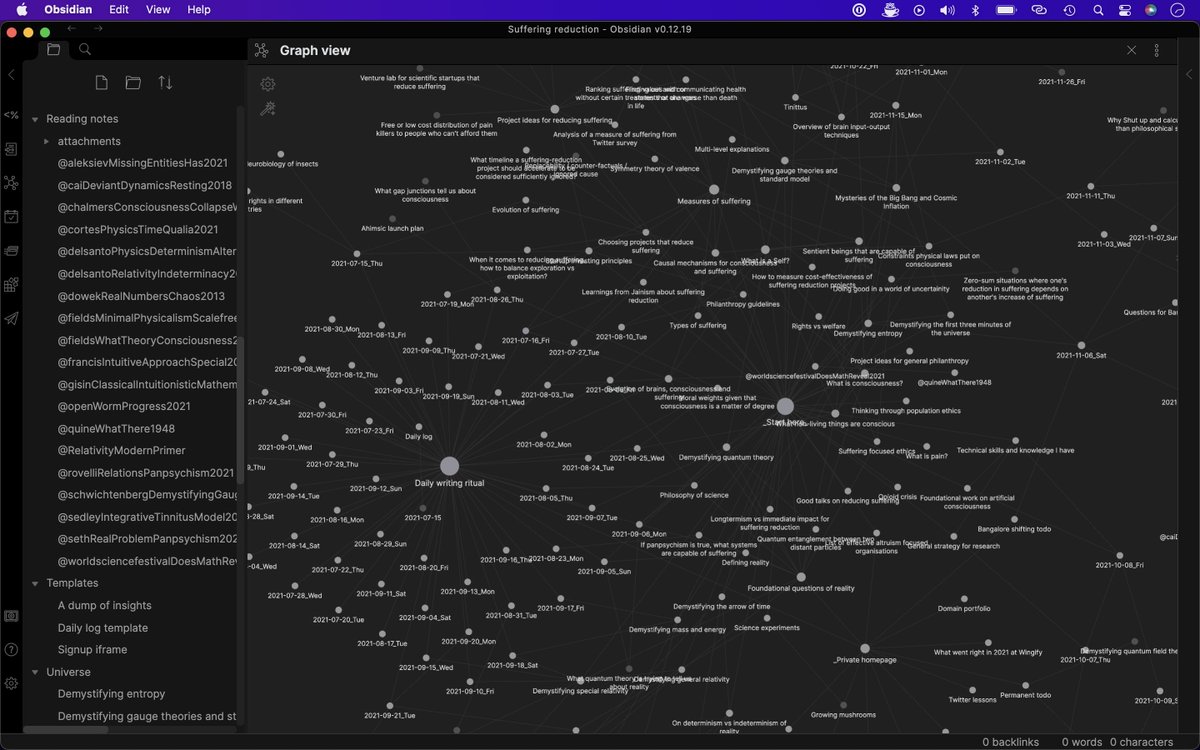
Notes from the #book "Dreams of a final theory" by Steven Weinberg, who won the Nobel Prize in physics in 1979 for unifying electromagnetism and weak nuclear force.
a 🧵
a 🧵

1/ First, a brief on Steven Weinberg.
What amazed me was that he kept working as a professional scientist until the very end.
His last paper uploaded on Arxiv was in Jan 2021 and he passed away in July 2021 at the age of 88.
Huge respect!
arxiv.org/abs/2101.04241
What amazed me was that he kept working as a professional scientist until the very end.
His last paper uploaded on Arxiv was in Jan 2021 and he passed away in July 2021 at the age of 88.
Huge respect!
arxiv.org/abs/2101.04241
2/ I came across this book as a recommendation by Nima Arkani-Hamed who said this is the book on physics that he would gift to everyone if he could.
My notes from Nima's interview are here:
My notes from Nima's interview are here:
https://twitter.com/paraschopra/status/1446012359860912130
3/ Dreams of a final theory is a defense for why we should seek the ultimate laws of nature and what form they could take.
Many people believe that one set of laws that explain everything else is impossible, but the history of science has shown convergence, not divergence.
Many people believe that one set of laws that explain everything else is impossible, but the history of science has shown convergence, not divergence.
4/ In fact, the convergence of the arrows of explanation is what Steven means by "ultimate" laws.
He dreams of a theory from which all constants of nature and all dynamical laws are able to get derived.
He dreams of a theory from which all constants of nature and all dynamical laws are able to get derived.
5/ How will we discover the final theory?
Nobody knows for sure, but we can look towards history to see how has physics evolved.
Steven stresses that theories which are "logically rigid" have surpassed theories with free parameters.
Nobody knows for sure, but we can look towards history to see how has physics evolved.
Steven stresses that theories which are "logically rigid" have surpassed theories with free parameters.
6/ What is meant by logical rigidness?
Newton's law of gravitation depends on distance squared, but it could easily have been distance cubed or distance raised to the power 2.0001.
There's no explanation for distance squared apart from the fact that it fits the data.
Newton's law of gravitation depends on distance squared, but it could easily have been distance cubed or distance raised to the power 2.0001.
There's no explanation for distance squared apart from the fact that it fits the data.
7/ However, Einstein's general relativity cannot be modified similarly without crumbling down the entire edifice.
Similarly, many people have tried to modify quantum mechanics slightly but all attempts have been unsuccessful.
Similarly, many people have tried to modify quantum mechanics slightly but all attempts have been unsuccessful.
8/ In the best case, our ultimate theory will prove to be logically inevitable which will prove why the world exists (because it _had_ to).
But this may be a high bar.
But this may be a high bar.
9/ Steven suspects that the final theory may instead be logically isolated where a description for our universe (its constants and laws) logically emerge from the tight structure of the theory AND that there would be no way for us to modify the structure without destroying it all
10/ Of course, the question of why this ultimate law and not something else might still remain and there may not be a way out of it.
Physics is supposed to stop working beyond a point. (But, every time we thought we're done with physics, we've gotten even deeper explanations)
Physics is supposed to stop working beyond a point. (But, every time we thought we're done with physics, we've gotten even deeper explanations)
11/ To explain why this final law and not something else, we may invoke Noczik's Principle of Fecundity:
"different logically acceptable universes all in some sense exist, each with its own set of fundamental laws."
In other words, everything logically possible actually happens
"different logically acceptable universes all in some sense exist, each with its own set of fundamental laws."
In other words, everything logically possible actually happens
12/ I suspect Principle of Fecundity is true but there's no way to prove it, so we may just have to be religious about that.
But perhaps we can push our decision on this for later. First, we need to find the ultimate unified theory and only then ask why it and not something else
But perhaps we can push our decision on this for later. First, we need to find the ultimate unified theory and only then ask why it and not something else
13/ Even if the ultimate unified theory is not found to be logically inevitable, we may realize that it's more likely than brute facts.
14/ So, logical inevitability is not a binary thing. Perhaps it's a continuum.
For example, something like quantum mechanics may emerge in many mathematical structures and if that's demonstrated, it may be a satisfactory explanation for why our world follows quantum mechanics.
For example, something like quantum mechanics may emerge in many mathematical structures and if that's demonstrated, it may be a satisfactory explanation for why our world follows quantum mechanics.
15/ What are current candidates for the ultimate laws?
String theory is the strongest contender. Unfortunately, it makes predictions (such as extra dimensions) that can only be detected at high energies (which are not economically feasible to achieve).
String theory is the strongest contender. Unfortunately, it makes predictions (such as extra dimensions) that can only be detected at high energies (which are not economically feasible to achieve).
16/ One thing I learned about string theory (which should have been obvious):
it wasn't developed by someone thinking that particles are like strings and then did the math.
Rather, a mathematical model of particles exhibited behavior like strings and that was developed further.
it wasn't developed by someone thinking that particles are like strings and then did the math.
Rather, a mathematical model of particles exhibited behavior like strings and that was developed further.
17/ Some of my highlighted notes from the book follow.
On the independence of universe from human concerns:
>no one has ever discovered any correlation between the importance of anything to us and its importance in the laws of nature.
On the independence of universe from human concerns:
>no one has ever discovered any correlation between the importance of anything to us and its importance in the laws of nature.
18/ On difficulty of taking religion seriously:
>But the God of birds and trees would have to be also the God of birth defects and cancer.
>But the God of birds and trees would have to be also the God of birth defects and cancer.
19/ On what Einstein meant by God and what people understand by it.
>religion did not arise in the minds of men and women who speculated about infinitely prescient first causes
but in the hearts of those who longed for the continual intervention of an interested God.
>religion did not arise in the minds of men and women who speculated about infinitely prescient first causes
but in the hearts of those who longed for the continual intervention of an interested God.
21/ On value of philosophy for scientists.
>The insights of philosophers have occasionally benefited physicists, but generally in a negative fashion – by protecting them from the preconceptions of other philosophers.
>The insights of philosophers have occasionally benefited physicists, but generally in a negative fashion – by protecting them from the preconceptions of other philosophers.
22/ On beauty in science.
>This kind of rigidity in our physical theories is part of what we recognize as beauty.
>It is when we study truly fundamental problems that we expect to find beautiful answers.
>This kind of rigidity in our physical theories is part of what we recognize as beauty.
>It is when we study truly fundamental problems that we expect to find beautiful answers.
23/ On reductionism.
>reductionism is not a guideline for research programs, but an attitude toward nature itself. It is nothing more or
less than the perception that scientific principles are the way they are because of deeper scientific principles
>reductionism is not a guideline for research programs, but an attitude toward nature itself. It is nothing more or
less than the perception that scientific principles are the way they are because of deeper scientific principles
25/ On strangeness of final laws
>Richard Feynman once complained that journalists ask about future theories in terms of the ultimate particle of
matter or the final unification of all the forces, although in fact we have no idea whether these are the right
questions.
>Richard Feynman once complained that journalists ask about future theories in terms of the ultimate particle of
matter or the final unification of all the forces, although in fact we have no idea whether these are the right
questions.
26/ That's it!
Hope you enjoyed it.
The book also explains symmetry principles behind the standard model of particle physics.
I've made notes on that in my knowledge garden: notes.invertedpassion.com/Universe/Demys…
Hope you enjoyed it.
The book also explains symmetry principles behind the standard model of particle physics.
I've made notes on that in my knowledge garden: notes.invertedpassion.com/Universe/Demys…
• • •
Missing some Tweet in this thread? You can try to
force a refresh










